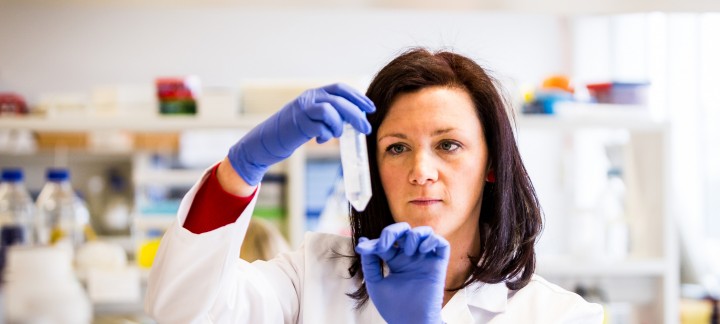Mercy Health promotes research throughout the organisation, supporting innovative projects and trials across a range of areas including obstetrics, gynaecology, mental health, paediatrics, reproductive medicine, aged care, midwifery and palliative care.
The extent and diversity of research undertaken across the group reflects a high level of interest and commitment to research and improvement in the delivery of care.
Mercy Health encourages research activity in all clinical areas of the organisation. There has been exceptional achievement across our research program. Several long-term studies within our University of Melbourne Department are yielding results of global significance, and many other areas in our hospitals are regularly publishing in peer-reviewed journals. Research in other areas such as allied health and aged care continues to evolve.
On 5 December 2016, Mercy Health launched a bold venture — Mercy Perinatal. Mercy Perinatal aspires to become a leading international perinatal centre of excellence uniting the three pillars of education, clinical care and research.
Mercy Perinatal has taken a lead in education initiatives. The Twilight Seminar series is run bi-monthly and streamed live to 30-50 sites around Australia and the world. The group’s annual flagship conference, the Global Obstetric Update, attracts an audience from across Australia and abroad to learn from the some of the world’s most esteemed academics.
Mercy Perinatal is already one of the leading centres of maternal fetal medicine in Australia with a large number of specialty clinics. It leads an active telemedicine program providing collaborative support to colleagues in Darwin.
Complementing its education and clinical pillars, the third pillar — research — is focused on developing new diagnostics and treatments to tackle major complications of pregnancy. Research teams under the Mercy Perinatal banner have already taken therapeutic and diagnostic concepts from initial discovery in the laboratory to major international trials in the United Kingdom, South Africa, New Zealand and Australia.
Mercy Health Group Chief Executive Officer Adjunct Professor Stephen Cornelissen explains the vital importance of translational research.
Mercy Health was established to make an impact in the lives of those in need. In areas like pregnancy and motherhood we can have a profound impact on the success of our society and our world.
Caring for women and bringing them and their babies safely through pregnancy begins a chain of good opportunities for those children, for their parents and for our community,” Stephen says.
“Worldwide, 500,000 babies are lost to just one condition which threatens pregnancies every year: preeclampsia. Imagine the benefits worldwide if those babies and mothers were given a better chance of survival — benefits to their lives, healthier communities, reduced costs to our health systems and a real sense of hope that we can solve some of the medical problems that have remained unsolved despite a wealth of progress in other areas. This is where we want to lead. This is where we want to deliver hope.”
Mercy Perinatal co-directors, professors Sue Walker and Stephen Tong, are both obstetricians with complementary skills.
Sue leads Mercy Hospital for Women’s Perinatal Medicine Department, which provides clinical care for some of the most complex pregnancies in Victoria. In 2011, she was appointed to a prestigious personal chair: the Sheila Handbury Chair of Maternal Fetal Medicine, University of Melbourne. Sue is currently the Head of the Department of Obstetrics and Gynaecology, University of Melbourne, in recognition of her contribution to research, teaching, engagement and leadership.
Stephen is a clinician-scientist who leads the Translational Obstetrics Group (TOG), a team of 10-15 researchers based at Mercy Hospital for Women who operate across several sub-groups. Stephen has published over 120 papers, most in leading international journals. He currently holds six NHMRC project grants. A grant he held was selected by NHMRC as one of the ‘10 best project grants’ featured in 2016. Stephen also holds two patents.
Research Ethics and Governance
See the Mercy Health Research Handbook for information regarding research ethics and governance requirements and how to prepare and submit a research application.
Transition of Mercy Health Human Research Ethics Committee service to St Vincent’s
We are excited to announce St Vincent’s HREC is ready to accept new research applications from Mercy Health. The St Vincent’s HREC submission portal for Mercy Health Research is now live. They will also review research governance.
St Vincent’s HREC:
- Committees meet fortnightly to review higher risk applications, offering a quicker turnaround
- Has a 5-7 business day turn-around time to review low risk applications
- Accepts multi-site ethics applications
- Has a representative from Catholic mission on all HREC committees.
- Will include representatives from Mercy Health to provide specialty expertise (six appointments).
To submit new applications:
Click this link: https://www.svhm.org.au/research/researchers/mercy-health, and follow the instructions. Hosted on the St Vincent’s webpage, this is a direct portal for Mercy Health applications.
Researchers will still need endorsement from their Head of Unit/Department as part of the ethics submission. If the head is one of the listed researchers, endorsement needs to come from the administrator whom the head reports to. Evidence of endorsement from head of any supporting department e.g. Pharmacy, Pathology, etc. must also be provided. Endorsements may be provided either by signature on the application form or via Mercy Health email.
You must have an ethics approval letter and a governance approval letter before you commence your project.
This change streamlines ethics approval processes and provides Mercy Health researchers access to more frequent HREC meetings, enabling speedier approvals.
For any issues, please contact the St Vincent’s HREC directly (see webpage).
For amendments and progress reports of existing Mercy Health HREC approved projects:
Submit directly to the Mercy Health Research Directorate via [email protected].
Incident reports:
All adverse events or other safety incidents must be reported via Mercy Health RiskMan.
Finally, we realise teething issues may arise. If there are general questions, contact the Research Directorate via Grace Wijnen ([email protected]).
Last reviewed December 12, 2017.



